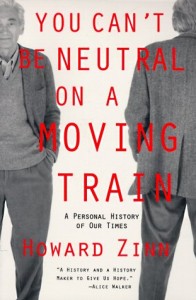 Searching through Netflix on a sweltering summer night, I decided to check out what the Instant Queue had to offer. I’ve heard of Howard Zinn and have read excerpts from several of his books including “A People’s History of the United States.†He has this everyman way of writing where, on the page, common sense becomes the most prophetic philosophy imaginable. This documentary, “You Can’t Be Neutral on a Moving Train,†is a biographical depiction of his life and the ideas that have shaped who Zinn is today.
Searching through Netflix on a sweltering summer night, I decided to check out what the Instant Queue had to offer. I’ve heard of Howard Zinn and have read excerpts from several of his books including “A People’s History of the United States.†He has this everyman way of writing where, on the page, common sense becomes the most prophetic philosophy imaginable. This documentary, “You Can’t Be Neutral on a Moving Train,†is a biographical depiction of his life and the ideas that have shaped who Zinn is today.
The most interesting parts had to do with his epiphanies or small moments in which a decision he made impacted his life. The time when his parents encouraged his reading habit by sending in 10 cents with a coupon to get books for him – a considerable amount of money, considering his parents were constantly on the move and were a part of the working poor in New York City- was that moment.
His eyes light up at the memory of finding a “Tarzan†paperback with pages missing. (It reminded me of the first book that sent me on my voracious journey as a reader – I look back now on the raggedy copy of “Aladdin and 40 Thieves†and still get that thrill of how powerful those words and pictures are as if it were the first time I read them.) The same dancing light comes up when he discusses how he met his wife. However, this is no ordinary biographic documentary. It seems as if Zinn, in his everyman way, has experienced or has been involved in various points of American history.
It started when he was a pilot in World War II. Bombing a small village in France with Napalm at the end of the war caused Zinn to go from fighting for his country to questioning his nation. It’s discussed in a small, quiet way, but becomes the catalyst for the remainder of the film. Narrated by Matt Damon, with excerpts from his books used to introduce the explanation of his ideas, Zinn’s philosophy on government and what they owe to its citizens reflects insights that I never deeply thought of before.
We always think of the civil rights movement as a “black thing†– never considering how the rights of all are influenced by the rights taken away from the few. As a professor at the black college Spelman, Zinn was an influence on Alice Walker, Marian Wright Edelman and countless others by protesting and introducing ideas. In essence, Zinn brought about change and for the status quo, change isn’t good. There is some speculation on Zinn’s part that the FBI had something to do with his firing, and that idea folds into his protest against the war in Vietnam and the continuing battle for equal rights to forming unions in the university he worked in.
Throughout the film, Zinn is this quiet force. This lanky, gray-haired man unassumingly battles for what he believes is right. What fascinates me is that it’s done by action and by the written word. The interspersing of his books being narrated alongside Zinn’s explanations for his behavior shows a man ever changing and trying to understand where he fits in the world in relation to the history of all people.
Searching through Netflix, I just wanted to be entertained, but thanks to the Queue I was also informed. Zinn might be too busy living his life – as for me, I was glad the heat slowed me down long enough to peak into this man’s life.

Leave a Reply